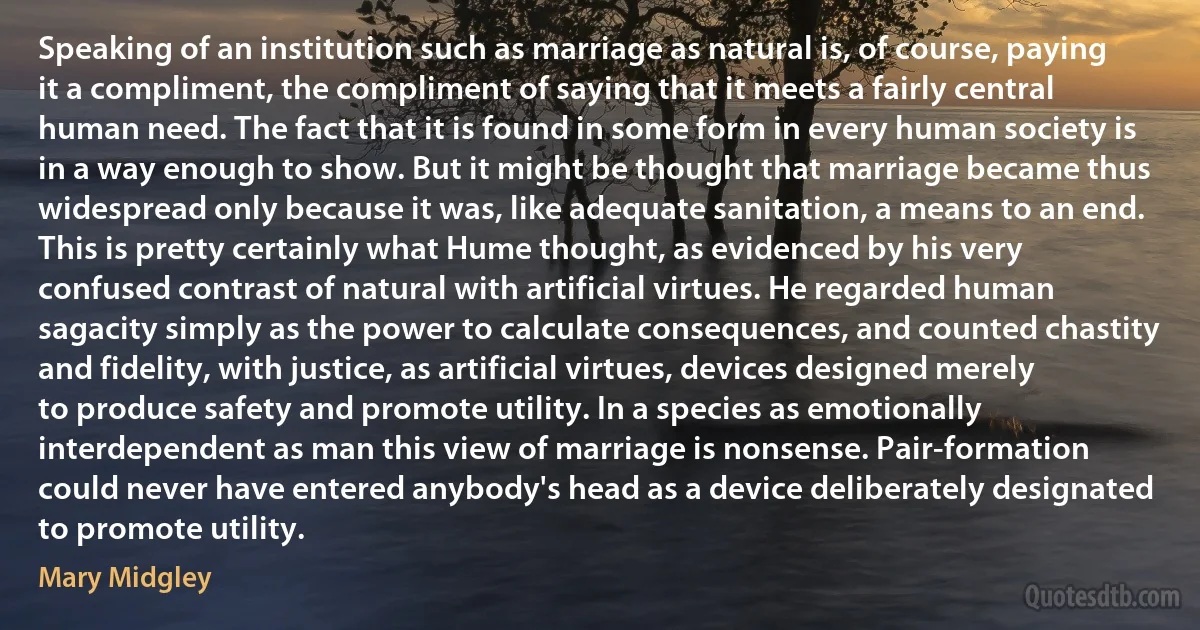
Speaking of an institution such as marriage as natural is, of course, paying it a compliment, the compliment of saying that it meets a fairly central human need. The fact that it is found in some form in every human society is in a way enough to show. But it might be thought that marriage became thus widespread only because it was, like adequate sanitation, a means to an end. This is pretty certainly what Hume thought, as evidenced by his very confused contrast of natural with artificial virtues. He regarded human sagacity simply as the power to calculate consequences, and counted chastity and fidelity, with justice, as artificial virtues, devices designed merely to produce safety and promote utility. In a species as emotionally interdependent as man this view of marriage is nonsense. Pair-formation could never have entered anybody's head as a device deliberately designated to promote utility.
Mary MidgleyRelated topics
central contrast course end enough found form head human institution justice man marriage might natural need power pretty produce sagacity sanitation saying show speaking thought thus utility view way means meets humeRelated quotes
For in spite of much greater public interest in all aspects of visual culture, including design and architecture, the challenge posed by contemporary art has not evaporated. We have only to recall the headlines for last year's Turner Prize. "Eminence without merit" (The Sunday Telegraph). "Tate trendies blow a raspberry" (Eastern Daily Press), and my favourite, "For 1,000 years art has been one of our great civilising forces. Today, pickled sheep and soiled bed threaten to make barbarians of us all" (The Daily Mail). Are these papers speaking the minds of their readers? I have no delusions. People may be attracted by the spectacle of new buildings, they may enjoy the social experience of visiting a museum, taking in the view, an espresso or glass of wine, purchasing a book or an artist designed t-shirt. Many are delighted to praise the museum, but remain deeply suspicious of the contents.

Nicholas Serota
Whereas many socialists have recently put their faith in market socialism, nineteenth-century socialists were, by contrast, for the most part opposed to market organization of economic life. The mainstream socialist pioneers favored something that they thought would be far superior, to wit, comprehensive central planning, which, it was hoped, could realize the socialist ideal of a truly sharing society. And the pioneers' successors were encouraged by what they interpreted as victories of planning, such as the industrialization of the Soviet Union and the early institution of educational and medical provision in the People's Republic of China. But central planning, at least as practiced in the past, is, we now know, a poor recipe for economic success, at any rate once a society has provided itself with the essentials of a modern productive system.

Gerald Cohen
In fact, the only person to rival Friedman for policy influence in the twentieth century is John Maynard Keynes, who had a strikingly different view of the role of government. Keynes was influential because he advocated more government intervention into what he perceived as poorly functioning private economies caught up in the Great Depression. In contrast to Keynes, Friedman put the main blame for the Depression on government failures, especially of monetary policy. Hence, the Depression did not make Friedman a fan of big government. He also found in the Federal Reserve's failure to prevent deflation an argument in favor of monetary rules. As the world evolved- with low inflation becoming the major mission of central banks and free markets and secure property rights becoming the main policies to promote economic growth-Friedman surely won the intellectual battle.

Robert Barro
Why should we put up with the present evils in our society? As opposed to the society we are visualizing, the present one can be described as a diseased one. The evils are there on all levels, international and national, and even within the smaller units such as towns and families. Of course, the disease did not appear like a bolt from the blue, either yesterday, or last year. It is the result of factors that have deep roots and long lives. These consist of privations, discriminations oppressions, bigotries, hatreds, and hostilities; poverty, ignorance, hunger, and illiteracy. Each and all of these have been left to us as ar evil heritage from the past. The fundamental difference between our situation today and that of our forefathers is that now knowledge has enabled us to realize that these evils are neither natural nor inevitable in the same way as we have found that cholera or the bubonic plague are not necessary calamities.

Muhammad Reza Pahlavi
In its most general form and from the point of view of physics, love is the internal, affectively apprehended, aspect of the affinity which links and draws together the elements of the world, centre to centre. This is how it has been understood by the great philosophers from Plato, the poet, to Nicolas of Cusa and other representatives of frigid scholasticism. Once this definition has been accepted, it gives rise to a series of important consequences. Love is power of producing inter-centric relationship. It is present, therefore (at least in a rudimentary state), in all the natural centres, living and pre-living, which make up the world; and it represents, too, the most profound, most direct, and most creative form of inter-action that it is possible to conceive between those centres. Love, in fact, is the expression and the agent of universal synthesis.

Pierre Teilhard de Chardin
